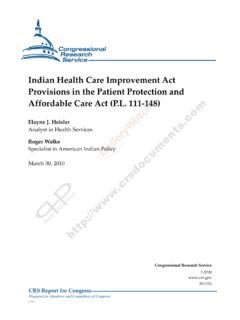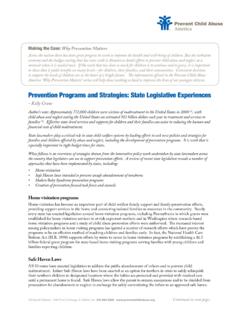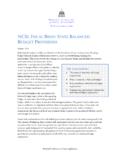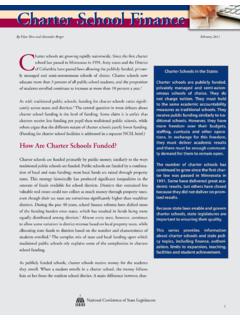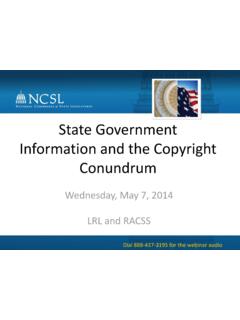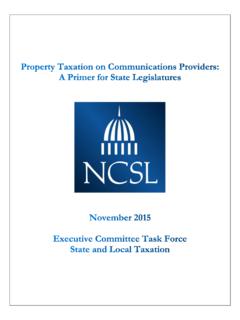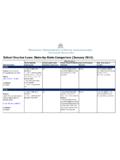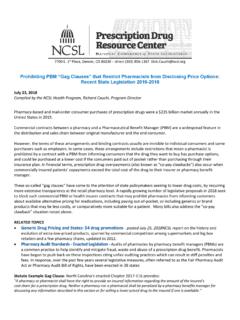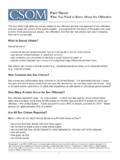Transcription of NCSL Fact Sheets on Health Reform
1 ncsl fact Sheets on Health Reform Issue: Extension of dependent Health coverage up to the age of 26. Citation: Title I, Part A, Subpart II, Sec. 2714. Statutory Requirement: Extension of Health coverage for young adult children under their parent's Health plan up to the age of 26. Effective Date: Group Coverage Effective the first plan year on or after September 23, 2010. Individual Market See policy year definition on page two, as defined in rule. Grandfathered Plans defined as an existing group Health plan or Health insurance coverage (including coverage from the individual Health insurance market) in which a person was enrolled on the date of enactment. Grandfathered plans must comply and allow young adults to enroll under their parent's coverage in plan years beginning six months on or after date of enactment (September 23, 2010). Prior to 2014, a child may enroll for dependent coverage in a grandfathered plan only if the individual is not eligible for employment based Health benefits.
2 State Regulated Plans state laws that impose stricter requirements on state regulated Health issuers than those required by federal law will not be superseded. States may continue to impose their current policies upon state regulated Health plans, or to conform their laws to the newly enacted Health Reform provisions. Premium Rate & Payment: The law is silent regarding the mechanism by which premiums for an adult dependent are paid. The Health plan may exclude coverage for pre existing conditions for a period of time depending on prevailing state and existing federal law if the dependent is 19 years of age or older and until the prohibition on pre existing condition exclusions takes effect in 2014. Interim Final Rules The Departments of Health and Human Services (HHS), Labor, and Treasury issued new regulations May 10, 2010, which will take effect 60 days after their publication (July 10, 2010). Rule Effective Date July 10, 2010, comments will be accepted until August 10, 2010.
3 HHS 45 CFR Subtitle A, Parts 144, 146 and 147. Jurisdiction Amends laws in Part 146, 147, and 148 of the Public Health Service Act (PHS Act) pertaining to group Health plans, group Health insurance issuers, and Health insurance issuers in the group and individual markets. Revises the definition of policy year in the individual market to mean the 12 month period that is designated as the policy year in the policy documents of the individual Health insurance coverage. If no policy year has been designated, then the policy year is the deductible or limit year used under the coverage. If deductibles or other limits are not imposed on a yearly basis, the policy year is the calendar year. DOL Employee Benefits Security Administration 29 CFR Chapter 2590. Jurisdiction Amends Part 2590 Rules and Regulations for Health Insurance Portability and Renewability for Group Health Plans. DOT Internal Revenue Service 26 CFR Parts 54 and 602.
4 1. Regulatory Requirements: Applicability group Health plans; group Health insurance issuers. Requires group and individual Health insurance plans that provides coverage to dependent children to extend coverage for these dependents until they reach their 26 birthday. Prohibits a plan from defining a dependent in any other way other that a relationship between a child and the participant. Prohibits a plan from denying or restricting coverage for a child who has not yet reached their 26th birthday based on the following: 1. Financial dependency, 2. Residency with participant, 3. Student status, 4. Employment, 5. Marital status, or 6. Combination of these factors. Prohibits coverage provided to dependents to vary based on age, except for children who are age 26 or older. Coverage must be offered to the dependent by the plan no later than the first day of the first plan year beginning on or after September 23, 2010.
5 Provides transitional relief for children whose coverage ended or was denied coverage under a group Health plan or other Health insurance coverage before reaching their 26th birthday. The enrollment opportunity must be provided during the initial plan year beginning on or after September 23, 2110 and thereafter. Dependents must be offered full benefits, and pay no more for coverage than similarly situated individuals who did not lose coverage by reason of dependent cessation. Special rule for grandfathered group Health plans. For plan years beginning before January 1, 2014, grandfathered plans may exclude an adult child who is not 26 years old from coverage if they are enrolled in an eligible employer . sponsored Health plan. Defines a grandfathered Health plan as being an existing group Health plan or Health insurance coverage (including coverage from the individual Health insurance market) in which a person was enrolled on the date of enactment of Health Reform legislation.
6 Therefore, as long as a person was enrolled in a Health insurance plan on March 23, 2010, that plan has been grandfathered. Specifies that children who are eligible for coverage and are currently covered under a COBRA continuation provision must be given the opportunity to enroll as a dependent of an active employee. If a child in this case loses eligibility for coverage due to a qualifying event, such as aging out of coverage, they will have an opportunity to elect COBRA. continuation coverage for another 36 months. Provides that if a plan has more than one benefit package option it must provide the individual the opportunity to enroll in any of these benefit package options for which they are eligible. Permits an employer to deduct from an employees' income the value of employer provided Health coverage for an employee's child for an entire taxable year during which the child turns 26, if the coverage continues until the end of that taxable year.
7 Effective date of coverage is the first day of the first plan year beginning on or after September 23, 2010. 2. Tax Treatment of Health Care Benefits Provided with Respect to Children Under Age 27. IRS Notice 2010 38 provides guidance on the Affordable Care Act's (the Act) amendment of Section 105(b) of the Code, effective March 30, 2010, to extend the general exclusion from gross income for the reimbursements for medical care under an employer provided accident or Health plan to any employee's child who has attained age 27 as of the end of the taxable year. The Act also makes parallel amendments that are effective March 30, 2010 to Section 401 (h) for retiree Health accounts in pension plans, to Section 501 (c) (9) for voluntary employees' beneficiary associations (VEBAs), and to Section 162(l) for deductions by self employed individuals for medical care insurance. A child is an individual who is a son, daughter, stepson, or stepdaughter of the employee, and a child include both a legally adopted individual of the employee and an individual who is lawfully placed with the employee for legal adoption by the employee.
8 The term also includes an eligible foster child who has been placed with the employee by an authorized placement agency or by judgment, decree, or other order of any court. Beginning March 30, 2010, employers with cafeteria plans that allow employees to choose from a menu of tax free benefit options and cash or taxable benefits are allowed to permit employees to begin making pre tax contributions to pay for Health coverage provided for an employee's children who are under 27 years of age. Plan sponsors then have until the end of 2010 to amend their cafeteria plan language to incorporate this change. State Issues States may continue to apply state law requirements except to the extent that the requirements prevent the application of the Affordable Care Act requirements. State insurance laws that are more stringent than the federal requirement are unlikely to prevent the application of . the Affordable Care Act, and be preempted.
9 State and local governments as sponsors will be required to provide notice of an enrollment opportunity to individuals whose coverage has ended, or who was denied coverage under their plans before the attainment of age 26. HHS estimates that 126,000 state and local governmental plans will have to send approximately 19,627,000. notices to eligible employees in the individual market, 490 will have to send approximately 5,444,000 notices to individuals with policies covering dependents. The associated equivalent cost is estimated at $6,791,000 to prepare and distribute 25,071,000 notices; distribution of notices will be approximately $777,000 excluding postage cost. Additional Information &Resources: Effective March 30, 2010, employers may permit employees to begin making pre tax contributions under a cafeteria plan (see description above) to provide coverage for children under age 27. IRS Notice 2010 38 Tax Treatment of Health Care Benefits Provided with Respect to Children Under Age 27 describes how employers with cafeteria plans are required to permit employees to begin making pre tax contributions to pay for expanded benefits to adult dependents.
10 [ drop/n 10 ]. 3.
